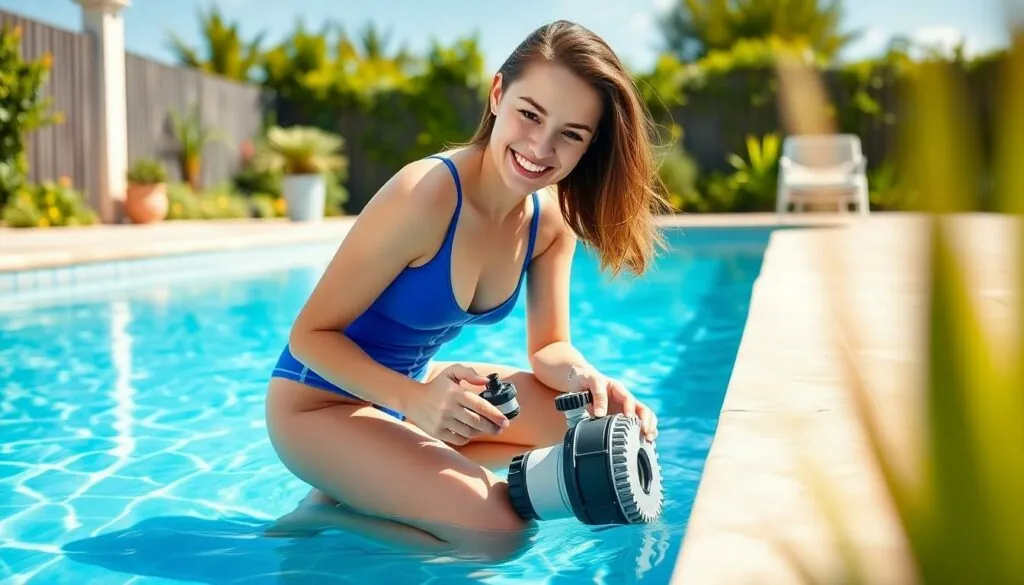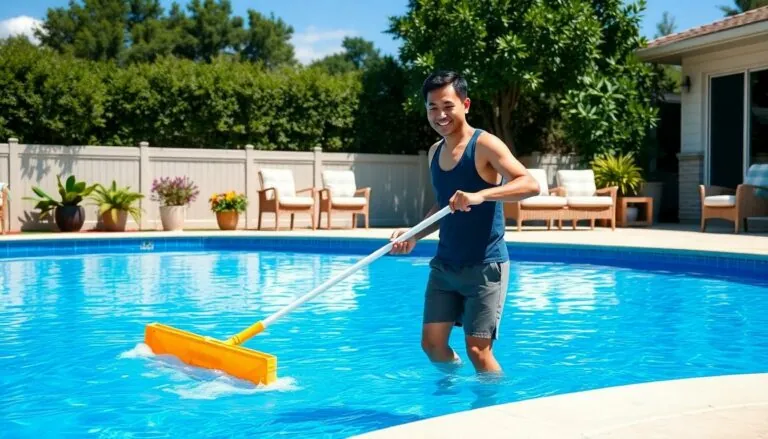Table of Contents
ToggleA clean pool is like a refreshing oasis on a hot summer day, but without proper pool filter maintenance, it can quickly turn into a swampy mess. Imagine diving into murky water that could rival a science experiment gone wrong. Not exactly the splashy summer fun anyone dreams of, right? Keeping that crystal-clear water requires a bit of TLC for your pool filter, and trust us, it’s easier than convincing your dog to take a bath.
Importance Of Pool Filter Maintenance
Proper pool filter maintenance keeps water clean and safe for swimmers. Filters remove debris, dirt, and contaminants from the pool. Neglecting this task can lead to cloudy water and health hazards from bacteria growth. Regular maintenance enhances the filter’s lifespan, saving time and money on replacements.
Energy efficiency improves with a well-maintained filter. A clean filter requires less energy to operate, decreasing electricity costs. In contrast, a clogged or dirty filter strains the pump, leading to increased energy consumption.
Routine maintenance boosts water circulation in the pool. Adequate circulation distributes chemicals evenly, reducing algae growth and ensuring balanced water chemistry. Inadequate circulation can create problem areas where contaminants accumulate.
Inspecting and cleaning filters regularly prevents potential system failures. A timely intervention can avert costly repairs, maintaining the overall condition of the pool system. Skipping maintenance leads to more extensive issues, including leaks or pump damage.
Understanding different filter types aids in effective maintenance. Sand filters require backwashing, cartridge filters need cleaning, and diatomaceous earth filters call for thorough rinsing. Each type has specific maintenance requirements that, when followed, keep pools inviting.
Educating pool owners about the significance of filter maintenance fosters better care practices. Regular reminders help them stay on schedule for cleaning tasks. Consistent attention leads to a more enjoyable swimming experience, making maintenance worth the effort.
Types Of Pool Filters

Various pool filter types play a crucial role in maintaining clean water. Selecting the right filter depends on individual pool needs and maintenance preferences.
Cartridge Filters
Cartridge filters utilize a removable filter cartridge designed to trap debris and dirt. Efficient operation allows for easy cleaning by rinsing the cartridge with a hose. The setup eliminates the need for backwashing, saving water and time. Regular inspections help detect wear and tear, ensuring optimal performance. Replacing cartridges typically occurs every 1 to 2 years based on usage and local conditions. Pool owners often appreciate the straightforward maintenance and reduced chemical use associated with cartridge filters.
Sand Filters
Sand filters employ a bed of sand to capture contaminants as water circulates through. Basic maintenance includes backwashing, which clears out accumulated debris and restores flow. Sand typically lasts 3 to 5 years before replacement becomes necessary. This type of filter is popular for its simplicity and effectiveness in handling larger debris. Adjusting the flow rate can enhance filtration efficiency and water clarity. Pool owners often find sand filters to be a practical and cost-effective solution for routine maintenance.
Diatomaceous Earth Filters
Diatomaceous earth filters use fine powder made from fossilized algae, providing exceptional filtration capabilities. Water passes through the DE powder, capturing microscopic particles and impurities. This type of filter requires occasional backwashing to maintain performance, similar to sand filters. DE typically lasts 4 to 6 months before replenishing is necessary. Pool owners appreciate the superior water clarity and cleanliness these filters offer. Regular maintenance ensures optimal function and longevity of the filtration system.
Regular Maintenance Tasks
Regular maintenance tasks ensure optimal filter performance and pool cleanliness. Consistent upkeep prevents larger issues down the line, safeguarding swimmer health.
Cleaning The Filter
Cleaning the filter ranks among the most essential maintenance tasks. Cartridge filters require rinsing every 4 to 6 weeks, while sand filters need backwashing when the pressure gauge reads 8 to 10 PSI above normal. Diatomaceous earth filters demand replenishment of DE powder every 4 to 6 months. All filter types benefit from regular checks to remove debris and contaminants. Neglecting cleaning can lead to reduced efficiency, making the pool less inviting.
Checking Water Levels
Water levels directly influence pool filter operation efficiency. Maintaining a water level between 1/2 and 1 inch above the skimmer ensures optimal performance. Low water levels may cause the pump to run dry, risking damage. In contrast, high levels can lead to inefficient skimming and poor circulation. Regular monitoring and adjustment of water levels keep the pool clean and filtration systems working effectively.
Inspecting Hoses And Connections
Inspecting hoses and connections is crucial for avoiding leaks and ensuring proper water flow. Regular checks can reveal wear, cracks, or blockages that may impede functionality. Replacing damaged hoses promptly prevents extended downtime and costly repairs. Secure connections reduce water loss and improve overall filtration efficiency. Routine inspections foster a proactive maintenance approach, ensuring a smoothly functioning pool system.
Troubleshooting Common Issues
Pool filters may encounter several issues that require immediate attention. Identifying these common problems can help maintain optimal filter performance and pool cleanliness.
Clogged Filters
Clogs can drastically reduce filter efficiency. Debris, dirt, or algae buildup often leads to this issue, particularly in sand filters. Regular inspection helps catch clogs early. Backwashing is effective for sand filters when experiencing reduced flow rates. Cartridge filters may require manual cleaning or cartridge replacement every few months to prevent clogging. Diatomaceous earth filters need replenishing of DE powder after backwashing to ensure effective filtration. Noticing cloudy water or reduced circulation signals that the filter might need cleaning.
Unusual Noises
Unusual noises are indicators of potential filter problems. A hissing sound often points to air leaks in the system, which can reduce water flow and efficiency. Grinding or rattling noises could signify loose components within the filter or pump, needing immediate attention. Swimmers might notice these sounds, and they should prompt a thorough inspection. If not addressed quickly, these noises may lead to more significant issues or costly repairs. Resolving these problems sooner rather than later preserves overall pool functionality and swimmer safety.
Seasonal Maintenance Tips
Seasonal maintenance of pool filters is integral for ensuring longevity and efficiency. Following these tips keeps pool water clean and safe.
Winterizing Your Pool Filter
Winterizing a pool filter prevents freeze damage and maintains its condition during cold months. First, clean the filter to remove debris. Next, drain water from the filter to avoid freezing. For sand filters, backwash to clear out dirt before shutting down the system. Diatomaceous earth filters should have the DE powder removed. Cartridge filters need their elements cleaned and dried. Covering the pool during winter offers additional protection against contaminants. These proactive measures enhance filter longevity and ensure a smooth transition to warmer months.
Spring Start-Up Procedures
Starting the pool for spring requires careful attention to the filter. Begin by removing the winter cover and cleaning it thoroughly. Inspect all components for signs of wear or damage. Check water levels and adjust as necessary before reactivating the filter system. For sand filters, backwash to clear out any residual debris from winter shutdown. Diatomaceous earth filters need new DE powder added. Cartridge filters should be re-installed and cleaned to ensure optimal performance. Balancing pool chemicals right after start-up keeps the water clear and inviting. Implementing these steps establishes an efficient and enjoyable swimming season.
Maintaining a pool filter is essential for ensuring a safe and enjoyable swimming environment. By committing to regular upkeep and understanding the specific needs of each filter type, pool owners can significantly enhance water quality and prolong the life of their filtration systems. Simple tasks like cleaning and inspecting filters, along with seasonal preparations, can prevent costly repairs and health hazards associated with poor water quality. With diligent maintenance, swimmers can enjoy crystal clear water and a more efficient pool system, making every swim a refreshing experience.




